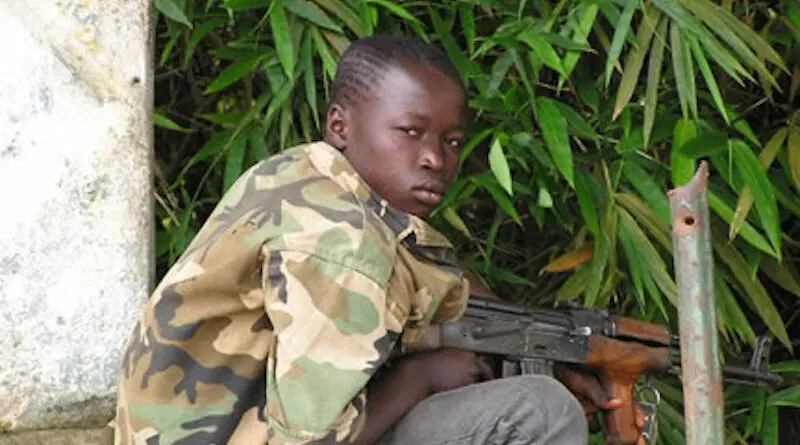As violence and instability rise, African countries must reaffirm their commitment to protecting children and support DDR initiatives.
Roughly 21 000 children have been recruited as soldiers by government forces and armed groups across Africa in the past five years. In 2020, around 337 million children lived within 50 km of active conflicts worldwide, with 118 million in Africa, where one in six risked being recruited.
Africa’s youthful population (40% are under 16 years) has seen rising violence, particularly in the Sahel, where Islamist insurgencies are expanding. A 2021 United Nations (UN) report highlighted West and Central Africa as the regions with the highest verified child soldier recruitment from 2016-20.
Globally, in 2021 alone, 6 310 children were drawn into conflict zones, with Africa accounting for 40% of the global child soldier population. And from 2005-22, over 105 000 children were documented as recruited by armed forces and non-state actors in conflict zones worldwide.
Minors typically join armed groups through abduction or coercion – recruited as soldiers, lookouts, porters, spies, cooks or sex slaves. Girls are especially vulnerable, compelled to work as spies, cooks and fighters. Some are forced to marry combatants.
In 2022, the UN Children’s Fund provided reintegration or protection support to nearly 12 500 former child soldiers and informed over nine million children about avoiding explosive remnants of war. It is estimated that over a billion US dollars were needed to meet the protection requirements of children in armed conflict by 2024, increasing to US$1.37 billion by 2026.
The economic impact of using child soldiers significantly hampers national development. Missing out on schooling results in lost human capital and reduced productivity, contributing to long-term economic stagnation, decreased workforce participation, higher poverty rates, and reduced foreign investment due to ongoing instability.
Countries also incur increased social service costs related to the healthcare and legal needs of former child soldiers, along with the social instability arising from reintegration challenges.
Child recruitment by armed groups and government forces remains a major problem despite international commitments. The Convention on the Rights of the Child has been ratified by 196 countries, and 173 have ratified the convention’s optional protocol that prohibits recruitment of children under 18 years into armed conflict.
The economic impact of using child soldiers significantly hampers national development
The Economic Community of West African States (ECOWAS) has taken steps to combat the problem by focusing on prevention, protection and reintegration. The ECOWAS Child Policy (2019-30) aims to prevent recruitment by promoting community awareness, legal reform, and tackling social and economic factors.
ECOWAS stands out for its regional approach, its Child Protection Unit and comprehensive disarmament, demobilisation and reintegration (DDR) programmes. Other regions also implement robust DDR initiatives but face hurdles such as logistical and security challenges, often relying on international support.
ECOWAS also promotes the enforcement of policies and laws, ensuring that violators face significant consequences. It has established monitoring and reporting mechanisms to collect data on child recruitment and hold perpetrators accountable. However, recent coups and the withdrawal of Burkina Faso, Mali and Niger from the regional bloc have weakened the Child Policy’s effectiveness.
Over the past 20 years, there have been DDR programmes in over 30 countries globally – with about two-thirds of these in Africa. These programmes have provided access to education, vocational training and psychological support, enabling former child soldiers to reintegrate into their communities, reducing stigma and re-recruitment risks.
Effective DDR is complex – requiring long-term funding and collaboration among governments, non-governmental organisations and international organisations.
ECOWAS stands out for its regional approach, Child Protection Unit and comprehensive DDR programmes
ECOWAS promotes community-based reintegration that engages local leaders, schools and civil society to ensure former youth fighters are accepted and supported. This involvement is crucial for fostering social cohesion and stability.
But ongoing challenges include financial constraints, political instability and cultural norms, which can reinforce child recruitment. Specialised care for trauma and mental health is limited, with few programmes offering combined education, vocational training and mental health support. A lack of accurate data hampers the monitoring and evaluation of DDR programmes.
Corruption also undermines child protection, diverting resources from essential services and eroding public trust, which deters communities from reporting abuses. In such environments, legal accountability is weak, allowing child exploitation to go unpunished.
To safeguard children, child protection systems must be strengthened at all levels of government and society. National laws prohibiting the recruitment of child soldiers must be prioritised across Africa. High-risk countries must provide comprehensive services for former youth fighters, and help local communities to effectively reintegrate former child soldiers and prevent their re-enlistment.
UN Security Council decisions on the issue should be reinvigorated to pressure member states to take greater proactive action. Thomas Lubanga Dyilo’s conviction by the International Criminal Court for using child soldiers in the Democratic Republic of the Congo shows how the international legal system can help curb the problem.

